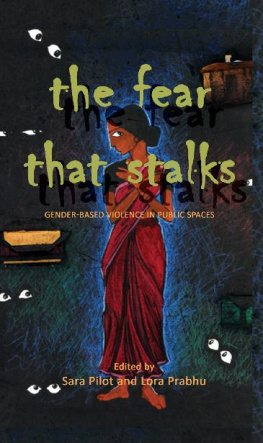
Hacking Gender and Technology in Journalism
Hacking Gender and Technology in Journalism addresses the question of whether journalisms new digital spaces suffer from the same gendered structures as traditional media organisations, or whether they go beyond such bias.
This book offers insights into the challenges that women journalists face in relation to technological innovation, as well as the potential for developing strategies for empowerment that it offers. More specifically, there is a focus on the gendering of digital skills, the construction of gender in new digital spheres of journalism, and how these changes can lead to the disruption of gender inequalities in journalism.
This book will be of interest to scholars in multimedia journalism, media ethics, and gender studies.
Sara De Vuyst is a postdoctoral researcher at the Department of Communication Studies at Ghent University. Her research interests are feminist media studies and, more specifically, gender issues and technological innovation journalism. She has a passion for feminism and a strong interest in digital storytelling, data journalism, and innovative journalistic formats. De Vuyst is vice-chair of the ECREA Gender and Communication section and part of a network of research on gendered online harassment.
Disruptions: Studies in Digital Journalism
Series editor: Bob Franklin
Disruptions refers to the radical changes provoked by the affordances of digital technologies that occur at a pace and on a scale that disrupts settled understandings and traditional ways of creating value, interacting and communicating both socially and professionally. The consequences for digital journalism involve far reaching changes to business models, professional practices, roles, ethics, products and even challenges to the accepted definitions and understandings of journalism. For Digital Journalism Studies, the field of academic inquiry which explores and examines digital journalism, disruption results in paradigmatic and tectonic shifts in scholarly concerns. It prompts reconsideration of research methods, theoretical analyses and responses (oppositional and consensual) to such changes, which have been described as being akin to a moment of mind-blowing uncertainty.
Routledges new book series, Disruptions: Studies in Digital Journalism, seeks to capture, examine and analyse these moments of exciting and explosive professional and scholarly innovation which characterize developments in the day-to-day practice of journalism in an age of digital media, and which are articulated in the newly emerging academic discipline of Digital Journalism Studies.
Making NonProfit News
Market Models, Influence and Journalistic Practice
Patrick Ferrucci
Conceptualizing Immersive Journalism
Ana Luisa Snchez Laws
Hacking Gender and Technology in Journalism
Sara De Vuyst
For more information, please visit: www.routledge.com/Disruptions/book-series/DISRUPTDIGJOUR
Hacking Gender and Technology in Journalism
Sara De Vuyst
First published 2020
by Routledge
2 Park Square, Milton Park, Abingdon, Oxon OX14 4RN
and by Routledge
52 Vanderbilt Avenue, New York, NY 10017
Routledge is an imprint of the Taylor & Francis Group, an informa business
2020 Sara De Vuyst
The right of Sara De Vuyst to be identified as author of this work has been asserted by her in accordance with sections 77 and 78 of the Copyright, Designs and Patents Act 1988.
All rights reserved. No part of this book may be reprinted or reproduced or utilised in any form or by any electronic, mechanical, or other means, now known or hereafter invented, including photocopying and recording, or in any information storage or retrieval system, without permission in writing from the publishers.
Trademark notice: Product or corporate names may be trademarks or registered trademarks, and are used only for identification and explanation without intent to infringe.
British Library Cataloguing-in-Publication Data
A catalogue record for this book is available from the British Library
Library of Congress Cataloging-in-Publication Data
A catalog record for this book has been requested
ISBN: 978-0-367-20528-7 (hbk)
ISBN: 978-0-429-26202-9 (ebk)
Typeset in Times New Roman
by Apex CoVantage, LLC
I would like to thank all journalists and technologists who have participated in my interviews for taking the time to talk to me and sharing their experiences.
A special thanks goes to Mariana Santos for inviting me to Stanford University and introducing me to Chicas Poderosas. Your enthusiasm about the empowerment of women and the energy of Chicas Poderosas is truly inspiring. Thank you, Luisa Ortiz Prez, for your advice on self-care and feminist strategies for researching online gender-based violence.
It was always a pleasure to participate in the Dataharvest conference and learn about new trends, tools and topics in data journalism. Thank you, Brigitte Alfter and Ides Debruyne, for organising and welcoming me at the event, sharing your knowledge on data journalism and introducing me to your colleagues.
I would like to express my thanks to Maria Edstrm and Monika Djerf-Pierre for the valuable feedback during my visit to Gothenburg University. I appreciate all the tips and connections that you shared with me. I came back from the research stay with many new ideas to start working on my book.
Thank you, Marie Germis and Julie Persyn, for your help with conducting interviews for the research on online harassment in journalism.
This book would not have been possible without the Routledge team. Thank you, Jennifer Vennall and Margaret Farrelly, for being there for me in every step of the process. Special thanks to the editor of the series, Bob Franklin, for the opportunity to work on this project and for the feedback throughout the writing of the book.
Hacking Gender and Technology in Journalism explores the gender dimensions of technological innovations in journalism. The word hacking in the title serves as a guideline throughout the book. Its multiple layers of meaning will be addressed in the different chapters. Even though hacking is often associated with computers and cyber criminality, it also refers to detecting lacks in a system and finding new, unforeseen ways to deal with them.
Feminism provides a lens that illustrates how gender inequality is actually a bug in the system of journalism. In news production, there are significant gender gaps in pay, recruitment, allocation of work and promotion that cannot be justified by differences in skill or quality of work. Even though the number of female journalists has drawn closer to the number of male journalists, they do not have equal opportunities to participate in decision-making and contribute to news content. Moreover, the claim that news media provide accurate, fair and balanced reporting that includes a diversity of voices is not met, since women are significantly underrepresented and portrayed stereotypically in the news. Gender bias, both in news content and production, prevents journalism from serving its audiences and fulfilling its core tasks of informing citizens and representing diverse opinions. It is a deficiency in how journalism operates and a loss to society and democracy because it diminishes the quality and representativeness of news (Adams, 2018; Edstrm, 2014; Tuchman, 1978).












